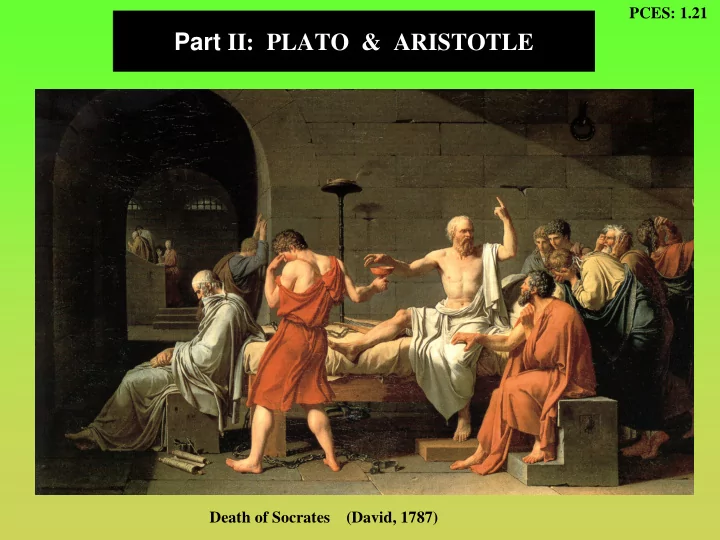

PCES: 1.21 Part II: PLATO & ARISTOTLE Death of Socrates (David, 1787)
PCES: 1.22 Plato: the Theory of Forms Plato was heavily influenced by Socrates when young, and also by the death of Socrates. Socrates was condemned by an Athenian court to die (and did so by voluntarily drinking hemlock, refusing an offer to escape made by friends). The charge was corrupting the young (which he had done by philosophizing, in a way which is described in Plato’s dialogues). This has immortalized the “Socratic method”, Socrates which tries to elucidate a problem, or the truth of an idea, (470-399 BC) by dialectic (question and answer) inquiry. The writings of Plato (which we have apparently in their entirety) are very wide-ranging. We are here concerned with those parts that are relevant to the physical world and our knowledge of it. This means that we shall concentrate on the “Theory of Forms” and its implication. A crucial conclusion of this theory is the existence of a supra-sensible realm of “ideas” or “forms”, beyond the world of appearances. Apart from Socrates, Plato was heavily influenced in the formulation of his ideas by (i) the ideas of Heraclitus and Parmenides on change vs. constancy, and (ii) the developments in mathematics (notably by his friend Thaetetus, and by the earlier Pythagorean school). Plato (428-348 BC)
PCES: 1.23 Aristotle: the Real World Aristotle was the most illustrious student of Plato; he was a pupil in his school “the Academy” and later founded his own (the “Lyceum”). He himself was a teacher to the young Alexander the Great- who later conquered & changed the whole of the known world as far as India, thereby vastly extending the influence of Greek ideas & culture (perhaps in line with Plato’s ideas on the role of education!). The influence of Aristotle on later European culture was Aristotle (384-322 BC) colossal. Aristotle classified and organized the whole of Greek thinking, in a way so comprehensive and detailed, and with such perception, that modern education is still designed along the lines he laid out. Unfortunately we only have later versions of his writings, the originals being lost (in, eg., the fire in Alexandria). From our point of view the principal interest of Aristotle is in his denial of Plato’s ideas about a supra-sensible world- he argues instead that there was only the one physical world, and that the fundamental “stuff” of this, which he called “substance”, had both matter and form- it was meaningless to separate off the Form. These 2, plus the ‘efficient cause’, and the ‘final cause’, are the 4 ‘causes’ by virtue of which the substance EXISTS. Aristotle & Alexander
Recommend
More recommend